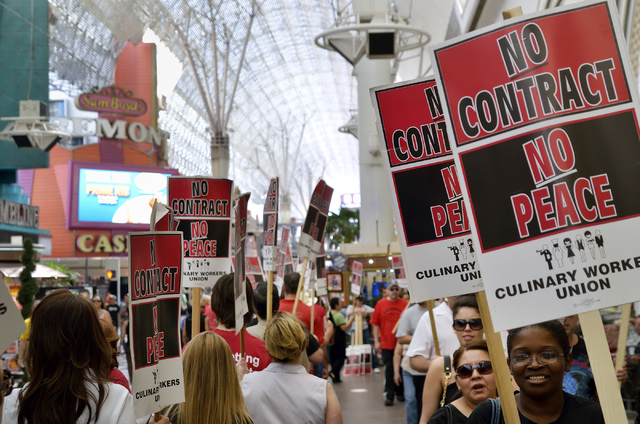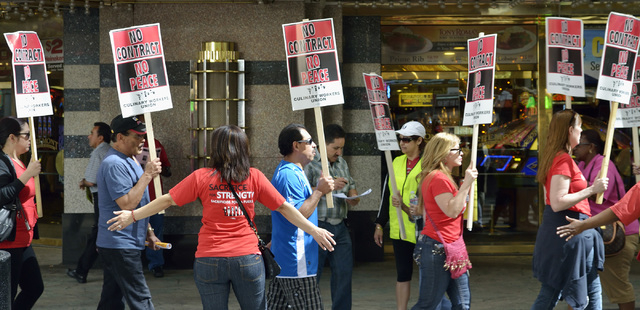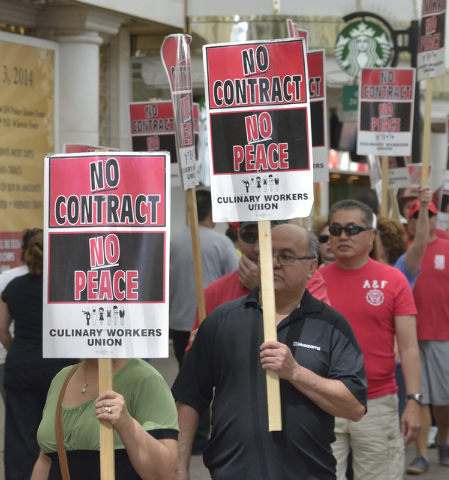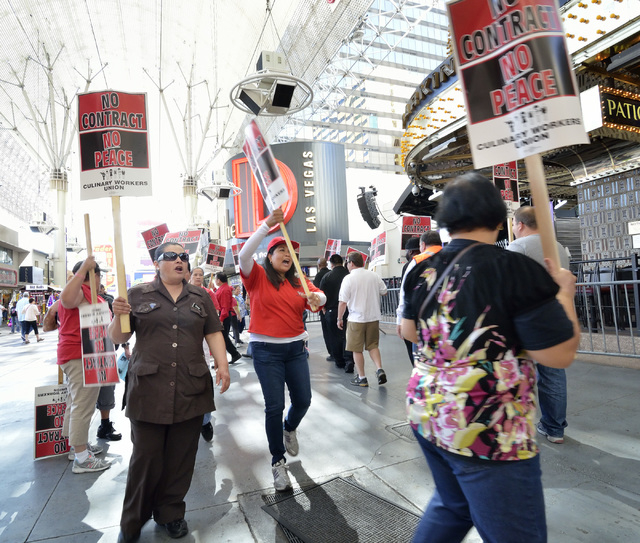Downtown Las Vegas unions show force as contract talks continue
In the past few weeks, the Culinary and Bartenders unions have authorized a strike, signed up thousands of workers for strike benefits and even spent hours picketing in front of 10 downtown Las Vegas casinos.
The show of force is a strong bargaining chip for the unions as they negotiate new contracts, labor experts say, particularly because it comes from the largest organized group of workers in Sin City.
“That’s kind of like lining up your troops on the border,” said Bill Werner, an associate professor of labor relations and employment law at UNLV. “It’s not an act of war, but it’s an act of preparation for war.”
All of this has taken place between shifts for some of Fremont Street’s most integral workers.
On Wednesday, the tactics resulted in a five-year contract deal with the Golden Nugget, which employs 1,200 union workers, but thousands more casino employees are working under expired contracts.
At the crux of the more than year-and-a-half-long negotiations is the Culinary union’s health and welfare plan. While they have co-pays and deductibles, workers don’t pay health insurance premiums, arguably the union’s biggest selling point.
Companies contribute to a health fund for every hour employees work, similar to a pension.
Culinary Local 226 and Bartenders Local 165 represent about 55,000 Las Vegas cooks, waitresses, housekeepers, bellhops, porters and other back-of-the-house workers, more than any other union in Southern Nevada. Bartenders and bar backs typically join forces with the Culinary union in contract negotiations.
MANY DOWNTOWN UNSETTLED
About 3,000 work at these downtown casino properties with still unsettled contracts: Binion’s, El Cortez, Four Queens, Fremont, Golden Gate, Las Vegas Club, the Plaza, Main Street Station, and The D.
The group in contract disputes includes another 1,000 workers from Brady Linen Service, the largest laundry service in Las Vegas, which cleans the sheets at roughly 60,000 hotel rooms. Every day, the company cleans about 800,000 pounds of laundry, including 25,000 uniforms, according to president Eric Brady.
He declined to comment on contract negotiations.
Casino officials, too, have stayed quiet about the deliberations.
Werner believes the least likely outcome is a strike at all remaining casinos, and others may follow the Golden Nugget contract agreement.
“Predicting a labor strike is very difficult,” Werner said. “You can read publicly about what the dispute is about, but the hard negotiations are held behind closed doors and in complete confidence. There’s no way for someone on the outside to really calculate the likelihood of a strike without knowing how far apart they are.”
Earlier this year, the unions agreed to five-year contracts with Strip casinos, keeping the health benefits intact.
Contract negotiations with the Culinary and Bartenders unions in Las Vegas follow standard procedure, Werner said. The groups first try to reach agreements with Strip casinos, then they seek similar deals with downtown casinos.
And so, a possible settlement is stalled.
“Downtown properties — most of them — can’t afford to sign the same contracts as the Strip properties,” Werner said. “But there’s no reason why some of the hotels wouldn’t jump ship and sign and others wouldn’t stand their ground.”
PROTESTS PART OF HISTORY
Culinary Local 226 has a long history of protests. The first citywide strike went on for 16 days in 1976, as legitimate corporations began to squash mob influence on casinos.
In 1984, 17,000 Culinary Union workers protested 32 resorts for 75 days. Nearly 900 strikers were arrested for harassing tourists and disrupting traffic on the Strip.
A strike at Binion’s Horseshoe in 1990 went on for more than nine months. Culinary Union workers launched another strike against the Frontier in 1991, and a resolution took more than six years.
The last time the union struck downtown was to protest the Golden Gate in 2002. That strike lasted only 10 days.
Jeff Waddoups, a UNLV labor economics professor, said strikes have steadily slowed across the country as labor union density declined, particularly in private sector jobs.
The union membership rate of private sector workers dipped to 6.7 percent in 2013, according to the U.S. Department of Labor.
No one expects the downtown dispute to reach the bitter levels of the 1984 protests. Waddoups said that strike was “too disruptive, too economically damaging” to the casinos and the workers.
“That was 30 years ago, so maybe people have forgotten,” he said. “But people who haven’t forgotten probably don’t want to go through that again.”
MANY FAVORED STRIKE AUTHORIZATION
Last month, when the unions voted to authorize a strike downtown, 99 percent of the workers favored the action, according to union spokeswoman Bethany Khan.
But replacement workers, or “scabs” as labor groups call them, are easier to find in struggling economies. Nevada’s unemployment rate, while declining, still sits at 8.5 percent, the third highest in the country, according to the Department of Labor. That could hamper the effects of a strike.
Pickets, even those like an informational protest that stretched the length of Fremont Street on Saturday, are mostly a powerful bargaining tactic.
“What the casinos sell is experience, fun and happiness, getting away from ugly stuff, getting away from everyday life,” Waddoups said. “And a strike just flies in the face of all that. So it might kind of damage the reputation of the casinos.”
In the downtown negotiations, Werner believes both sides have equal leverage, which could increase the probability of a strike.
“There’s not really an imbalance of power at the bargaining table,” Werner said. “The breaking point comes when the two parties have offered everything they’re going to offer, and it’s still not enough.”
Thousands of workers have signed up to receive strike benefits, which are pulled from a fund and spent through a debit card that would be activated if a strike is launched, according to Khan.
But that won’t come before further negotiations scheduled for this week, and the two sides could continue to talk for weeks to come. A strike could be months away, as discussions with each casino company are done separately.
“We’re leaving the door open to negotiate with companies,” Khan said. “No one wants to go on strike, and it’s really the last resort.”
Ronald Gladstone has worked at The D since 1989, and he’s been a member of the Culinary union since 1982, when he got a job as a bus boy for the Las Vegas Hilton. He has relatives who have been union members since its early days in the 1950s.
The 48-year-old kitchen steward is married with four grown children, including a 28-year-old daughter with Spina Bifida who lives with him.
Gladstone suffers from diabetes, high blood pressure and sleep apnea, so health insurance is vital to his family.
He’s ready to strike if he must.
“It’s not just about me, it’s about the people I work with,” he said. “I’m trying to keep a level playing field for these generations coming up behind us. I feel like I’m fighting for everybody — my friends, my neighbors, my grandkids. But we’re all in this together. I just hate when they separate us. We’re all here for one common goal: to make this ship float and keep it floating.”
Contact reporter David Ferrara at dferrara@reviewjournal.com or 702-387-5290. Follow @randompoker on Twitter.




















